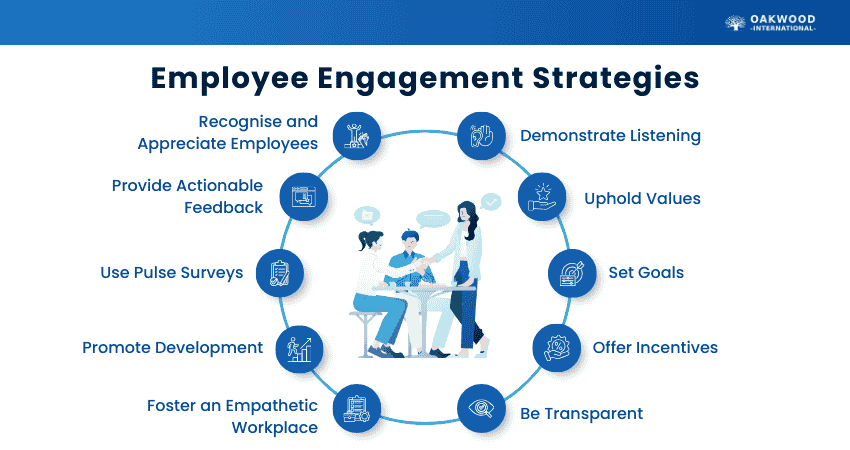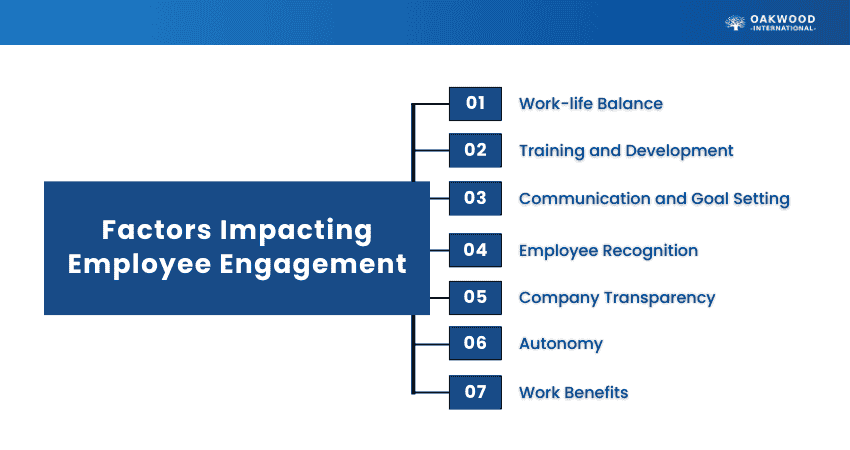Table of Contents


Work is no longer just about completing tasks or collecting a salary. People want appreciation for their efforts and a workplace where they genuinely feel they belong. When these needs are met, employees give more than time; they bring energy, commitment, and pride into their roles. This is where Employee Engagement Strategies make a real difference.
They shape how people experience work and influence how connected they feel to their roles. Creating strong engagement does not happen by accident. It requires thoughtful action, consistency, and leadership that values people as much as performance. In this blog, you will explore what Employee Engagement is, why it matters, and the most effective strategies you can apply to build stronger teams.
What is Employee Engagement?
Employee Engagement refers to the level of commitment and connection employees feel towards their work, team, and organisation. It reflects their enthusiasm, commitment, and willingness to contribute. Engaged employees enjoy their roles, feel valued, and stay motivated. This leads to higher productivity and a positive workplace culture where people feel appreciated and involved.
What are Employee Engagement Strategies?
Employee Engagement Strategies are methods organisations use to strengthen employee involvement and commitment to their roles. It helps them feel valued and connected to the company. When employees enjoy their jobs and feel appreciated, they work better, stay longer, and help the business grow.
A good strategy includes things like clear communication, fair rewards, and chances to learn new skills. For example, if a company regularly thanks employees, they feel encouraged to do their best. This makes the workplace more positive and productive for everyone, ultimately fostering a high-performing team.
Why is Employee Engagement Strategy Important?
Strong Employee Engagement Strategies are essential because they influence the overall culture and well-being of an organisation. When employees feel connected, valued, and engaged, they contribute to a positive workplace. Such a culture makes the workplace enjoyable but also increases retention, reduces turnover, and reinforces engagement.
Engagement has a powerful impact on performance and workplace relationships. Motivated employees communicate openly, build stronger teamwork, and deliver better services. As productivity rises, organisations benefit from stronger customer loyalty and increased revenue. This makes Employee Engagement Strategies integral for any business size.
Learn strategies for recruiting top talent with our Talent Management Training – Join today!
20 Employee Engagement Strategies
Here are 20 simple strategies to boost engagement and create a positive work environment:

1) Demonstrate Listening
Show employees that their opinions matter by actively listening to their ideas and concerns. When employees feel heard, they feel valued and engaged.
a) Helps build trust between employees and management
b) Encourages open and honest communication
c) Increases motivation and workplace satisfaction
2) Uphold Values
A company should stand by its core values in all decisions and actions. Employees feel more connected when their workplace aligns with their beliefs.
a) Creates a strong and positive work culture
b) Encourages employees to take pride in their work
c) Builds a trustworthy and ethical organisation
3) Set Goals
Clear goals give employees direction and purpose. They help employees stay focused and motivated.

a) Keeps employees engaged and on track
b) Increases productivity by setting clear expectations
c) Helps employees measure their own success
4) Personalise Programme
Not all employees are the same, so engagement strategies should be tailored to individual needs. Customised programmes make employees feel valued.
a) Increases job satisfaction by meeting personal needs
b) Makes employees feel recognised and appreciated
c) Boosts motivation and long-term commitment
5) Simplify Process
Complicated systems make work frustrating. Keeping processes simple helps employees stay focused and efficient.
a) Reduces stress and confusion in daily tasks.
b) Increases productivity by saving time.
c) Improves overall work experience.
6) Offer Incentives
Rewards and bonuses encourage employees to work harder and stay committed. Small incentives can make a big difference in motivation.
a) Encourages better performance and dedication
b) Makes employees feel valued and appreciated
c) Helps retain top talent in the company
7) Encourage Volunteering
Giving employees time to help the community creates a sense of purpose. It also builds teamwork and strengthens company values.
a) Improves employee morale and happiness
b) Builds a positive company reputation
c) Encourages teamwork and collaboration
8) Be Transparent
Employees trust companies that are open about their decisions. Transparency builds confidence and engagement.
a) Reduces workplace confusion and uncertainty
b) Encourages honest communication
c) Strengthens trust between employees and management
9) Host Team-building Activities
Fun activities bring employees together and improve teamwork. They create a friendly and engaging work environment.
a) Helps employees bond and build relationships
b) Reduces stress and improves morale
c) Encourages collaboration and teamwork
10) Encourage Cross-cultural Collaboration
A diverse workplace where different cultures work together creates new ideas and better teamwork. It makes the workplace more inclusive.
a) Encourages respect and understanding among employees
b) Brings fresh perspectives and ideas
c) Creates a welcoming and inclusive work environment
Learn workforce planning with our Workforce Resource Planning Training – Join today!
11) Delegate Strategically
Giving employees responsibilities based on their strengths helps them grow. It also improves efficiency and engagement.
a) Makes employees feel trusted and valued
b) Encourages skill development and leadership
c) Increases productivity by using strengths effectively
12) Foster an Empathetic Workplace
A caring workplace where people support each other helps employees feel comfortable and engaged. Empathy builds stronger relationships.

a) Creates a supportive and positive work culture
b) Reduces stress and improves mental well-being
c) Strengthens teamwork and cooperation
13) Promote Development
Helping employees learn new skills keeps them engaged and motivated. A company that supports growth earns employee loyalty.
a) Encourages career growth and improvement
b) Keeps employees inspired and engaged in their jobs
c) Helps the company grow with skilled employees
14) Establish Career Paths
Employees should have clear career growth opportunities. Knowing there’s a future in the company keeps them engaged.
a) Gives employees a sense of purpose and direction
b) Encourages long-term commitment to the company
c) Motivates employees to improve and grow
15) Use Pulse Surveys
Short surveys help companies understand how employees feel. Regular feedback, along with Employee Feedback Examples, leads to improvements in engagement.
a) Identifies problems before they become bigger issues
b) Shows employees that their opinions matter
c) Helps improve workplace culture and policies
16) Form Employee Partnerships
Letting employees be part of company decisions makes them feel involved. They work harder when they feel their input matters.
a) Increases loyalty and commitment
b) Makes employees feel valued and respected
c) Encourages innovation and fresh ideas
17) Empower Employees as Mentors
Experienced employees should guide and support others. Mentorship builds confidence and strengthens engagement.
a) Helps employees grow in their careers
b) Builds strong relationships and teamwork
c) Encourages a learning culture in the company
18) Provide Actionable Feedback
Employees need clear and useful feedback to improve. Giving specific suggestions helps them grow.
a) Encourages continuous learning and development
b) Boosts confidence by highlighting strengths
c) Prevents mistakes from repeating in the future
19) Recognise and Appreciate Employees
Saying “thank you” or rewarding employees for good work makes a big difference. Appreciation increases motivation.
a) Boosts employee morale and job satisfaction
b) Encourages employees to keep performing well
c) Creates a positive and happy work environment
20) Ensure Clear Communication
Good communication prevents misunderstandings and confusion. Employees stay engaged when they know what’s expected.
a) Builds trust between employees and management
b) Keeps work running smoothly and efficiently
c) Reduces mistakes and workplace frustration
Lead with confidence and step into leadership excellence with Successful People Management and Team Leadership Course – Join now!
What Impacts Employee Engagement?
Employee Engagement is influenced by several factors in a workplace. Let's look at the seven main areas that play a major role in shaping employee experience at work:

1) Work-life Balance
Flexibility reduces stress and prevents burnout. Engaged employees experience lower turnover. This makes bringing balance essential for long-term employee retention and strong long-term commitment to the organisation.
2) Training and Development
Training equips employees with skills to grow and succeed in their roles. Strong onboarding and continuous learning help to prevent disengagement and stagnation. Also, development opportunities show employees the company is prepared to invest in their future.
3) Communication and Goal Setting
Clear communication ensures employees understand expectations, reduces confusion, and frustration. It provides purpose and direction, aligning individual efforts with company goals. Strong communication builds accountability and a positive workplace culture.
4) Employee Recognition
Recognition motivates employees by making them feel valued for their contributions. Acknowledging their achievements strengthens trust between leadership and staff. Such a culture of recognition drives satisfaction and engagement.
5) Company Transparency
Fostering a transparent culture is essential for building trust and commitment to the company’s vision. A lack of transparency can lead to scepticism and disengagement. This is why it is essential to make employees feel more engaged through open and honest leadership.
6) Autonomy
Autonomy empowers employees with control and ownership over their work and decisions. Trust from managers boosts confidence, loyalty, and motivation. A great autonomy leads to higher job satisfaction and improved performance.
7) Work Benefits
Benefits packages increase loyalty and make employees feel supported. They improve focus, productivity, and attendance across the workforce. Stronger work benefits also enhance recruiting efforts and retention.
Shape the future of work and drive organisational success through HR Strategy Training – Join now!
Employee Engagement Case Studies and Real-world Examples
Understanding the successful engagement initiatives from industry leaders provides valuable insights into what works effectively in practice. Let’s look at the case studies below that demonstrate effective Employee Engagement Strategies:
Case Study 1: Expereo - Uniting and Engaging Employees Around the Company Vision
Expereo is a global leader in internet connectivity solutions. They faced a major transformation as it shifted from a wholesale model to a direct enterprise sales approach. This required not only redefining market positioning, but also ensuring employees were aligned with the company’s new vision.
a) Challenges:
Communicating the transformation externally while engaging employees internally to deliver consistent messaging.
b) Solution:
Implemented gamification, content creation, and online sharing strategies that boosted both internal and external communication.
c) Results:
a) Rapid adoption with 70% of employees onboarded in just two weeks.
b) Employee advocacy campaigns achieved LinkedIn follower targets in only 19 days.
c) A cultural transformation that consolidated innovation, collaboration, and active employee participation.
Case Study 2: AXA Group – Energising Internal Communication and Engaging Employees
AXA Group, a global insurance and asset management company, modernised its internal communication across a diverse, multinational workforce. The goal was to unify employees and create a platform that encouraged active participation.
a) Challenges:
Fragmented communication across regions and departments, and a need to engage employees with relevant content.
b) Solution:
Launched POP, a user-friendly internal communication platform with segmented channels and varied content formats.
c) Results:
a) POP adopted by 70,000 employees across 15 countries.
b) It turned out to be the primary source of information, surpassing traditional channels.
c) High engagement levels due to ease of use and diverse content options.
Conclusion
Employee Engagement supports stronger performance across every part of an organisation. When businesses invest in effective Employee Engagement Strategies, they see better collaboration, improved retention, and more consistent results. Over time, this strengthens customer experience, supports innovation, and contributes to long-term organisational success.
Strengthen workplace harmony and build trust with Employee Engagement Training – Register now!


 Back
Back



 Back to Catagories
Back to Catagories





 + 44 7452 122728
+ 44 7452 122728










